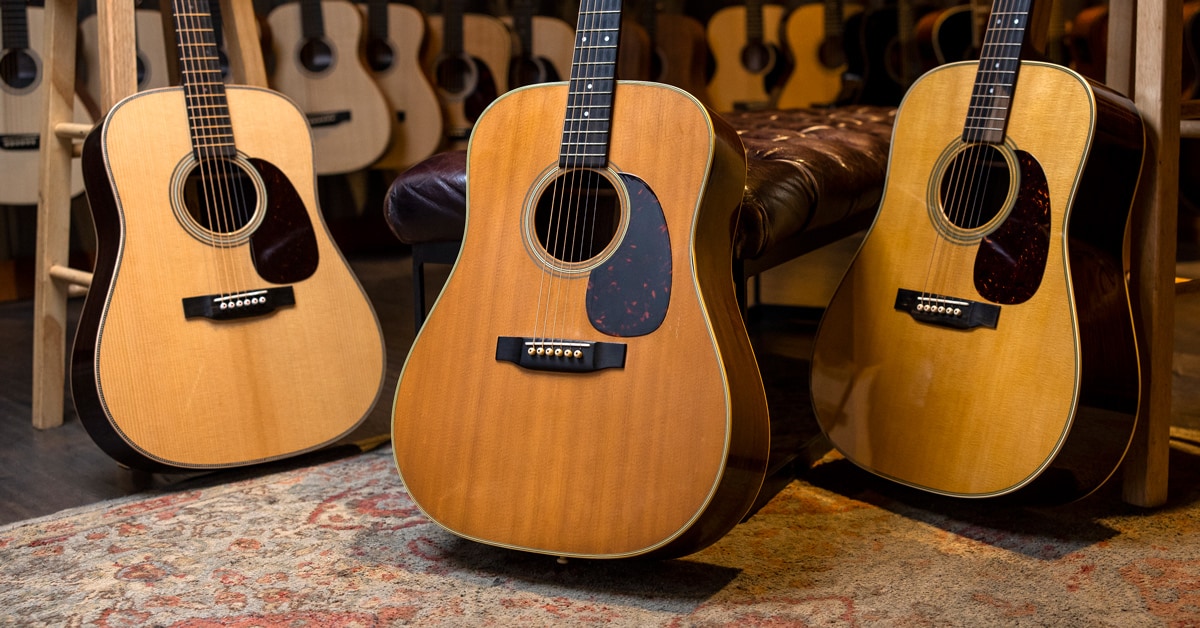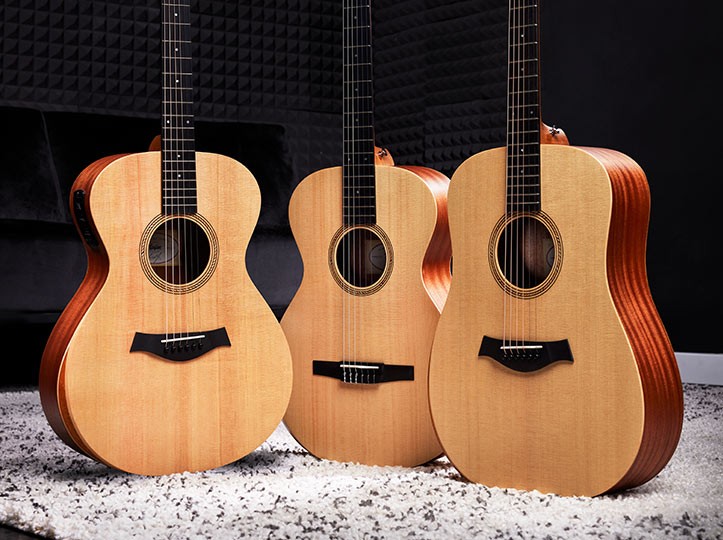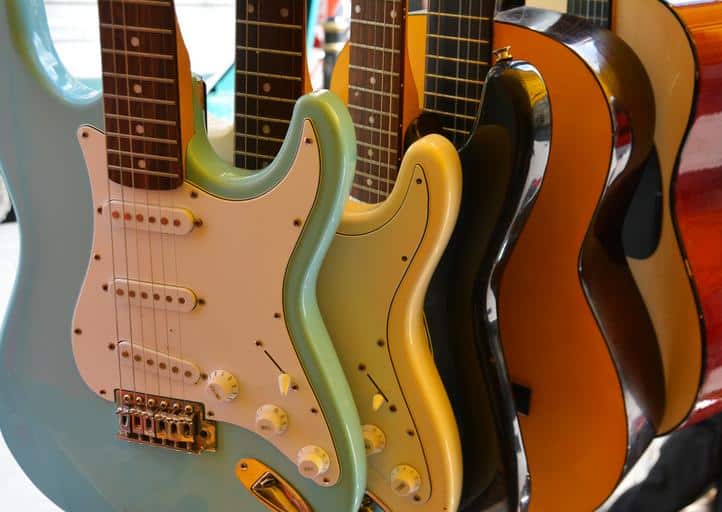Are you dreaming of a career in country music but don’t know where to start? Looking for the perfect acoustic guitar to make your country tunes sound their best?
This guide will take you through what makes an acoustic guitar ideal for playing country music, the features you should look out for and top models on the market. You’re guaranteed to find your perfect fit.
Acoustic guitars have been integral to the sound of country music since the dawn of the genre. From early blues and folk influences to songs by groundbreaking artists like Hank Williams and Patsy Cline, acoustic guitar has been a driving force behind country music.
The history of acoustic guitars within country music tells us a few things about its importance: it’s not just a mere accompaniment-it’s an essential part of the sound that has propelled some of the genre’s biggest hits. Acoustic guitarists have historically balanced intricate technique with raw emotion, creating sounds that still captivate listeners today.
In this guide, we’ll take a look at the features and types of acoustic guitars that are commonly used for playing country music, as well as exploring popular models from key manufacturers like Martin and Taylor. We’ll also discuss some of the key players who have embraced these instruments over time, including figures such as Chet Atkins and Doc Watson, who became renowned for their mastery and skill in playing this style on an acoustic guitar.
Whether you’re just getting into pickin’ or are a highly experienced player looking to enhance your sound with various techniques and tones, there’s plenty here to help you on your way! By expanding your knowledge on what makes an acoustic guitar suitable for playing country music -and by extension all other types-you can confidently choose the best model for your jaunty crusade into Picker Paradise.

Features of Acoustic Guitars for Country Music
The features of an acoustic guitar play a major role in determining how it will sound and what type of country music you can play on it. It’s important to consider these features when choosing an acoustic guitar for country music, as they heavily influence the sound that you will be able to produce.
Body: There are several different types of body shapes with acoustic guitars, the most common being Dreadnought, Grand Concert, Orchestra Model, and Jumbo. Each of these different shapes will give you a distinct tone – Dreadnought bodies provide more volume and bass, while Grand Concert bodies are focused more towards high-end clarity.
Finish: The type of finish on your guitar is another key factor when deciding which acoustic guitar for country music to buy. Finishes such as satin or lacquer provide a warmer tone than gloss finishes do. Matte finishes also absorb more strings overtones and create a softer sound overall.
Neck & Fretboard: The neck and frets of your acoustic are incredibly important in producing style-appropriate tones for Country Music. For example, Mahogany necks tend to produce a brighter tone than maple necks; rosewood fretboards typically give your Country Music greater warmth; thicker necks offer fingerpicking styles a greater resonance that’s perfect for twangy sounds; jumbo frets help create bending notes that’s essential in many Country Music styles; compound radius fretboards make transitioning between chording and single string notes more seamless; larger headstocks support lower tunings better than smaller ones do; Tusq nuts draw out brighter treble sounds compared to other options such as plastic or bone nuts; curved Radius bridges assist single note lines by giving wider tonal range on the strings due to increased action height compared to flat bridges etc..
Body Shape
The body shape of your guitar is an important factor when selecting an acoustic guitar for Country music. Body styles vary widely, and the style that is right for you will depend on your playing style and the sound that you are looking to produce. The most common body shapes are Dreadnought, Grand Auditorium, Grand Concert or even Jumbo-sized jumbo.
Dreadnoughts are large and powerful; they provide a deep bass response along with high levels of volume. They are great for making big chords and other aggressive playing styles. Flying V guitars are also popular; these have a more defined tonal character, making them great for soloing in Country music styles, but their lack of deep resonance can be a problem when strumming chords.
Grand Auditorium guitars have been quite popular lately; this shape gives you good balance between treble and bass tones. Grand Concert and Jumbo shapes provide an even larger sound than a Dreadnought or Flying V; this makes them ideal for country songs that require more low-end power.
No matter which body shape you choose, make sure you do some research on sound before committing to one type or another — different models can perform differently in terms of tone, so listen to several different models until you find one that fits your needs best!
Tonewoods

Tonewoods are an important factor when considering any acoustic guitars, but it especially matters when playing country music. The type of wood used to construct the guitar will directly affect the tonal character of the music you create. While many players are loyal to their favorite tonewoods, some specific woods work better for certain styles.
Spruce is one of the most popular tonewoods used on acoustic guitars because it has an even, balanced tone and produces clear notes and articulate highs and mids. This makes it a great choice for fingerpicking and flatpicking as these techniques require crispness in sound. Cedar is another popular choice as it responds instantly to attack, has a lively resonance that can heal overtones, and produces sweetly-rounded lows with strong mids.
Other than spruce or cedar, mahogany is known to have a quick attack and good sustain, making it a perfect choice for those who prefer powerful strumming techniques that don’t require loud mid or high frequencies nor swift note articulations. One of the most remarkable things about mahogany is that it can produce heavy emphasis on low notes which can be interesting when bringing contrast between verses in a song or adding contrast between different parts of instrumental pieces.
Neck Shape
The neck shape and size of an acoustic guitar can have a huge influence on the sound and playability. When playing country music, the preferred neck shape is generally rounded with a comfortable C-shape. This offers more sustenance in the sound, as well as ease of accessibility when strumming or manipulating certain chords or riffs.
Due to the nature of how slap, brush and finger-style picking are executed, keeping constant tension on all strings throughout a song is essential. A comfort level with one’s instrument will enhance artistic expression and technical accuracy while playing, especially in busy solos where fast passages need to be precise.
Factors to Consider When Choosing an Acoustic Guitar for Country Music

Picking the right guitar for country music primarily depends on the style of music you are playing. While it is important to get a guitar that is comfortable and easy to play, there are a few key features and specifications that can help enhance your country sounds.
Body: Acoustic guitars can come in small, mid-sized or large body shapes. Generally, smaller-sized guitars have increased projection and are easier to hold, while larger guitars have resonance and resonate better on lower notes. For country music, we recommend a mid-sized body shape as it is the best of both worlds in terms of projection and sound.
Tonewoods: Tonewoods affect the overall tone of an acoustic guitar. The most commonly used tonewoods for highest quality acoustic guitars include mahogany, cedar and spruce. Typically mahogany produces warmer tones with more overall presence (especially when it comes to rhythm), cedar adds highs for more projection with a sharper attack and spruce adds definition for fingerstyle playing (typically used in Americana/Bluegrass). It’s best to try out various tonewoods to hear which one works best for your desired sound.
Wooden components: In addition to tonewoods, many acoustic guitars are fitted with other wooden parts such as bracing (for strength), bridge plates (to improve tone) nut slots (for string height adjustment) top taper (for better intonation) straps disks etc… For country music make sure your guitar utilizes quality wood components as they will make all the difference when it comes to creating great sounding tones!
Electronics: While most experienced players opt out of adding electronics into their acoustic guitar set up, some choose this option if they plan on amplifying their sound at some point down the line. Generally speaking, piezo pickups give off more natural sounding tones compared to single coil or humbucker styled pickups so keep that in mind when looking into electronics options for your instrument!
Budget
When shopping for an acoustic guitar with country music in mind, there is a range of budgets which one can consider. Generally speaking, lower end instruments are available for those on tighter budgets, however the quality of the sound and playing experience will be compromised. If you are certainly looking to invest in a quality instrument, there are mid and higher-end options available.
For budget-friendly instruments, some common features to look out for would include mahogany or basswood back/sides and spruce tops as well as smaller nut width and scale length due to being parlor styles. Additionally an all-laminate guitar body would suggest that it is on a lower price bracket due to its more budget build.
Lower priced acoustic guitars may sound thinner without much bass response but can offer playability nonetheless. A good example of a budget acoustic which still offers advantages such as tone and playability is the Yamaha FG830 (Natural Finishing), which has a strong dreadnought design with rosewood back & sides and solid Sitka spruce top with scalloped bracing construction which in turn helps maximize the bold sonic character usually associated with country music.
Body Size

The size of the guitar body will have a major impact on its sound. Acoustic guitars come in many sizes, and each project sound differently. The most common guitar body type used in country music is the dreadnought, which projects a warm and powerful tone. Other popular body types include the Jumbo, Auditorium (or Grand Concert or Orchestra), and Parlor style guitars.
The Dreadnought offers a strong bass response and great volume projection, making it an ideal choice for flat picking styles as well as strum and finger style playing. It also has20 frets with plenty of room for bending and soloing. This is the most popular acoustic body type for country music players because it offers a unique combination of big sound and affordability.
The Jumbo produces an impressive bass response which can be loud enough to fill large venues without assistance from an amplifier or PA system. It also has more booming treble register than the dreadnought making it good for slide playing styles where rich lows are needed to balance out higher notes. Nonetheless, this model generally costs more than other models due to its larger size.
The Auditorium or Grand Concert guitar is small yet punchy and bright – perfect for fingerstyle techniques like Travis picking or blues-based strumming patterns that don’t require quite as much projection as wider-bodied instruments offer but do need some clarity in the mids and upper registers – lush lows will still remain when needed! It also has fewer frets so solos may be limited if wanted on this model while they excel at chord progression passages with clean ringing tones produced when those certain strings are hit along either side of its reduced fret board area than other models offer.
Playability
Ease of playability should be a high priority when looking for an acoustic guitar that is suitable for country music. Guitarists of all levels should check for those aspects such as how the strings feel under their fingers, the neck size and shape, and whether the body is comfortable to hold.
The action should be low enough so that bar chords are comfortable to play, and when strummed hard, the strings should not buzz on the frets. Players should consider at least playing a few notes on any guitar they try before investing in it — this position often helps them make an informed decision. An adjustable truss rod also ensures that necessary changes can be made easily and regularly as desirable by the player.
It’s also important to think beyond looks. If a guitar has fancy inlays or engravings but doesn’t sound right, then a more plain-looking model might work better in the long run. Or better yet, they could always customize it themselves with paint jobs or simple etchings after they been playing on it for some time. Last but not least, acoustic guitars with good pickup systems like under-saddle transducers are very helpful when performing live onstage or recording material quickly in a studio setting with minimal setup time required!
Maintenance and Care for Acoustic Guitars for Country Music
Owning a quality acoustic guitar for country music is an investment and one that deserves due proper care and maintenance. Over time, the instrument may deviate from its original sound performance, relying on regular maintenance and proper protection to preserve it for upcoming musical performances. Here are some tips to help you take good care of your acoustic guitar:
- Cleaning – Regularly wipe down the body of your guitar with a soft and non-abrasive cloth to rid it of dirt, grime, and any other residue that can cause damage to it over time. Don’t forget to pay close attention to fingerboard too—they naturally attract oils and dust that needs to be wiped away frequently.
- Adjustment – Nuts, bridges, saddles, strings, and fretboards can all require periodic adjustment in terms of tightening, lowering action or raising relief over time due to the natural wear and tear they experience on a daily basis. Have it looked at by a professional luthier if you’re not comfortable doing this yourself (knowing when certain adjustments need made may be difficult even for experienced players!)
- Avoid Extreme Temperatures – Acoustic guitars should not be exposed to extreme cold or heat as this will warp the body curvature overtime making adjustments more difficult than originally anticipated; if you don’t want to spend extra money on restoring your beloved instrument—avoid humidity/temperature changes!
- Always Use Covers – When storing your instrument cover or case it—leather cases are preferred as they provide the best protection from sun damage but these can often be costly; make sure that whatever type of material you opt for is thick enough so as not scratch away any natural finish from your guitar’s body while still providing adequate breathing room between bagging layers!
Cleaning
Caring for an acoustic guitar doesn’t just mean regularly dusting it off and inspecting its structural integrity. To get the most out of your instrument, you should be cleaning it regularly. This maintenance not only helps to maintain a pristine appearance, but also contributes to improved playability and sound quality.
Using the right tools is important when cleaning an acoustic guitar, as can often damage the finish of your instrument with objects that are too rough or have sharp edges. A soft-bristled brush and a polishing cloth should be all you need to keep your guitar looking great in its natural state. A special fretboard cleaning oil can also be used on occasion to give extra shine and protection to fingerboards made of hardwoods like rosewood or ebony.
While every few months you may want to give your guitar an extra thorough cleaning with a high-quality lemon oil polish, just giving it a clean and coat with natural cleaners after each use should be more than enough for maintaining a beautiful sheen on the body and neck of your acoustic guitar. Additionally, it’s important to ensure that areas such as bridge pins and tuning machine plates are lightly greased. This will help reduce wear on mechanics that are constantly used during tuning and stringing, providing longevity for these components from dryness-based damage over time.
Storage
Storage is a key factor that should not be overlooked when selecting your guitar. Acoustic guitars are more vulnerable to environmental changes compared to electric guitars since they do not contain electronic components. Therefore, it’s important to take measures to protect the guitar from extreme temperatures, dryness, and humidity. To protect your acoustic guitar from these changes, it is essential to store it in an environment with stable temperature and relative humidity levels.
Here are some general tips for proper storage of your acoustic guitar:
- Keep the temperature between 50°F – 80°F (10°C – 28°C).
- Keep the relative humidity level between 30 – 50%.
- Store the instrument in its hardshell case when not in use.
- Do NOT store in a basement or attic; these areas typically suffer from drastic swings in temperature and relative humidity levels which can damage or warp the neck of the guitar over time.
- To raise the relative humidity level inside a hardshell case (or any kind of carrying case), you can purchase a pouch of humidifier beads/crystals or use a few damp paper towels that are placed inside a plastic bag. Note: Do NOT directly place damp paper towels in your case as this may cause mold growth on metal surfaces over time!
Humidity Control
In order to make sure that your acoustic guitar sounds its best, no matter the environment you find yourself playing in, it is essential to consider humidity control.
Wood instruments such as guitars require a certain level of humidity to perform consistently and smoothly. Humidity issues can cause tuning problems and make stringed instruments difficult or impossible to play.
Humidity levels should hover around 45-50%, but areas like the Pacific Northwest of the United States or states with high levels of humidity, like Florida, will fall outside of this range often during different seasons. This is why it’s important for any acoustic guitar intended for serious playing – especially when used for a live performance – to have some sort of humidification system built into it.
In most cases this will come in form of an undersaddle pickup, complete with both single-coil and humbucking sound options — perfect for achieving those classic country tones! Gibson’s Humitrack feature also works wonders when coupled with its Fishman preamp pickups; other companies such as Martin also offer onboard solutions. With options like these at your fingertips, you can rest assured that your instrument’s sound remains consistent no matter where you take it!
Conclusion
Choosing the right acoustic guitar for playing country music is an individual decision. Each guitar offers features that will make it either a better fit for country music, such as its tonal projection, construction, body type and fingerboard. Additionally, it’s important to consider the top brands of acoustic guitars and consider what top professional musicians are playing when selecting a model.
The best way to find the perfect acoustic guitar for country music is to play several different models and choose the one that feels most comfortable in your hands and gives you the sound you’re looking for. This can be done in a store setting or online if there’s not an appropriate store close by. We hope our guide has given you some insights into popular guitars for playing country music, so that narrowing down your options is a bit easier when looking for your next instrument!
FAQs
What is the best acoustic guitar for playing country music?
There is no one “best” acoustic guitar for playing country music, as different guitarists may prefer different styles and models based on their personal preferences and playing styles. Some popular options for country music include Martin and Taylor guitars.
Which guitar is best for country music?
Again, there is no one “best” guitar for country music, but some popular options include dreadnought-style guitars from brands like Martin and Taylor, as well as Gibson J-45 and Hummingbird models.
What type of guitars do country singers use?
Country singers use a variety of guitars depending on their personal preferences and playing styles, but some popular options include Martin and Taylor dreadnought-style guitars, Gibson J-45 and Hummingbird models, and Fender Telecaster and Stratocaster electric guitars.
What is the most beautiful sounding acoustic guitar?
This is subjective and can vary depending on personal preferences, but some popular options for beautiful-sounding acoustic guitars include the Martin D-28, Taylor 814ce, and Gibson J-200.
What is the best wood for country acoustic guitar?
Again, this can vary depending on personal preferences, but some popular woods for country acoustic guitars include spruce for the top and mahogany for the back and sides.
Which guitar is best for sound?
There is no one “best” guitar for sound, as different guitars may have different tonal qualities and appeal to different players. Some popular options for acoustic guitars with great sound include Martin and Taylor guitars.
Which acoustic guitar is best for singing?
A good acoustic guitar for singing will depend on the player’s personal preferences and playing style, but some popular options include the Martin D-28 and Taylor 814ce.
What makes a guitar sound country?
A guitar can sound “country” depending on a variety of factors, including its tone and sound characteristics, the playing style of the guitarist, and the type of music being played.
How do you get a good country guitar tone?
To achieve a good country guitar tone, players may experiment with different playing techniques, use a guitar with a balanced and bright sound, and use the appropriate amplification and effects if playing with an electric guitar.
Can you play country music on an acoustic guitar?
Yes, acoustic guitars are a popular choice for playing country music, as they can provide a warm and natural sound that complements the style.
See Also :
- Best over the sink dish rack 2023
- Best white sink 2023
- Best over sink dish rack 2023
- Best wheelchair accessible bathroom sink 2023
- Best laundry room sink 2023

